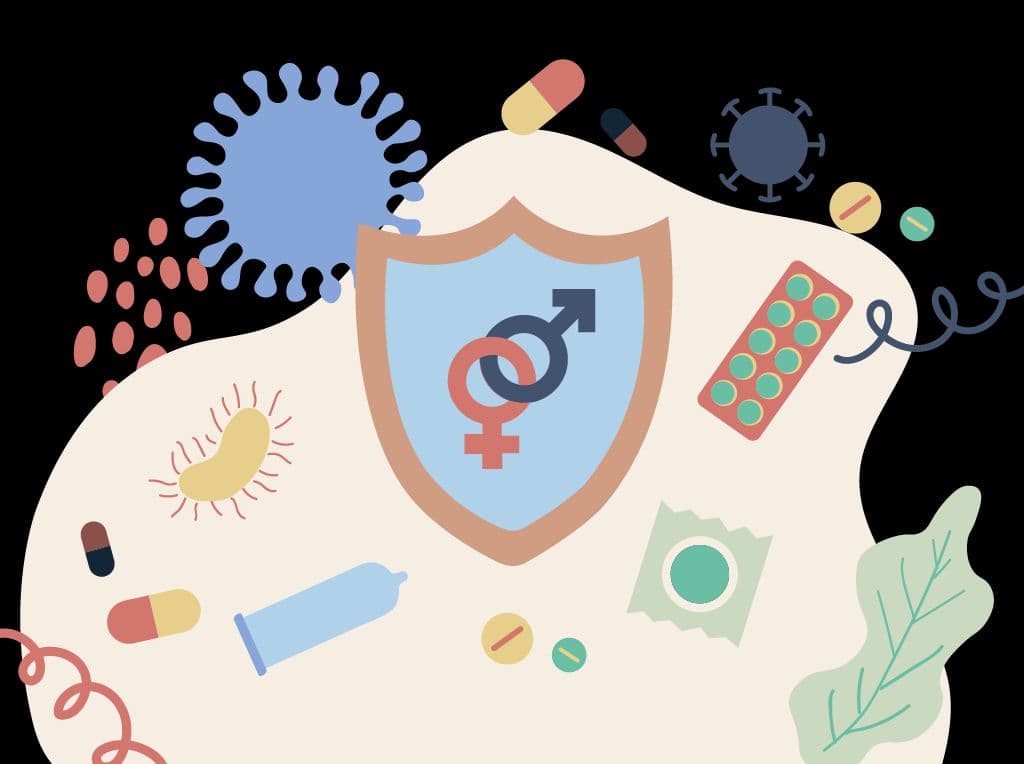What is STI?
The term sexually transmitted infection (STI) is used to refer to an infection passed through sexual contact. A person can contract an STI by having unprotected vaginal, anal, or oral sex with someone who has an STI. Sexually transmitted infections may be passed from person to person in blood, semen, or vaginal and exchange of other bodily fluids. Sometimes these infections can be transmitted nonsexually, such as from mother to infant during pregnancy or childbirth, or through blood transfusions or shared needles.
Are STI and STDs the same?
Let’s first start with the full forms of both terms. STI refers to sexually transmitted infection and STD refers to sexually transmitted disease. An STI is considered a disease only when it causes symptoms. Since most infections are asymptomatic, the term STI is generally preferred. However, CDC says that both the terms can be used interchangeably as they largely mean the same.
How common are STIs?
Very common. Worldwide, there are 1 million new cases of STIs every day. In India, it is estimated that 6% of the adult population has an STI, which means we see 30-35 million episodes of STI every year. Another important thing to note is that because of the taboo and misconceptions around STIs, testing is not very widespread in India, and these numbers may not be a true reflection of the actual situation.
What are the common STIs?
STIs can be caused by bacteria, viruses or parasites. Common STIs are HIV, Chlamydia, Gonorrhea, Syphilis, Trichomoniasis, HPV, Hepatitis B and C and Herpes.
What are the common symptoms of STI? Are all STI symptomatic?
● Any foul smelling, itchy, blood-stained or copious discharge from the vagina
● Pain or burning sensation while passing urine
● Lower belly pain or pain during vaginal penetration in women
● Spotting/bleeding between periods in women
● Testicular or scrotal pain in men
● Swollen or painful lymph nodes, particularly in the groin area
In most cases, STIs are asymptomatic, meaning that a person could be infected but show no symptoms. The only way to know for certain if you have an STI is to get tested. A person who is asymptomatic can pass on the infection. Both the partners need to get tested for maximum assurance. It is important to know the STI status of both partners before engaging in any sexual activity.If you had a new sex partner or multiple partners, it’s best to get checked. STIs can be contracted through vaginal, anal or even through oral sex.
How can one contract an infection?
● Sexual activity (oral/anal/vaginal sex or genital touching)
● Exposure to infected blood or body fluids
● Skin-to-skin contact (esp. if your partner has active sores or lesions)
● Sharing of needles/syringes (esp. in case of HIV, Hepatitis B & C)
● Mother to child transmission during pregnancy or childbirth
Why is testing so important?
Since STI‘s can be asymptomatic, testing is the only way to know for sure if you have an STI.
Who should get tested for STIs?
It is best to get tested if
● you are sexually active (have engaged in oral/anal/vaginal sex or genital touching)
● you are entering a new relationship or have recently switched partners
● you are sharing or have previously shared needles or other kinds of injection equipment
● you have symptoms suggestive of a sexually transmitted infection
● you have been sexually active in the past and never been tested
● you have been sexually assaulted
Testing can help you prevent infertility in the future. Certain symptoms of STI can be similar to fungal or test infections, the testing will help to figure if it's an STI or not. It can help you get the correct treatment and manage the condition. This also prevents you from passing on the infection to others.
How often should you get tested for STIs?
- Get tested at least once a year if you are sexually active. This is important even if you have been with the same partner for a while
- You may need to test more frequently (between 2-4 times a year) if you have multiple unsafe sexual encounters, are sharing needles or tattooing equipment or have not followed safe sex practices such as using condoms.
- A great rule of thumb is to get tested every time you switch partners. Get tested before you engage in any sexual activity with a new partner. Encourage your partner to get tested.
- All pregnant women are tested early in pregnancy to prevent complications during pregnancy and also to ensure that it is not passed on to the child.

How can I prevent getting STIs?
Proper personal hygiene and safe sexual practices can help in preventing STIs.
Here are some ways that you can enjoy safer sex:
1. Be open to talking about sexual history and testing with a new partner
Create a safe space for yourself and your partner to have a comfortable conversation around sexual history and STI's. Being open with your partner can definitely spice up your sex life. Discussing your results and the last time you got tested are some things you may bring up.
2. Be aware of your risk if you have more than one sex partner at the same time
Bear in mind, when it comes to STI’s, behaviour > number of partners. You need to know that unsafe and unprotected sexual practices (whether anal, oral or vaginal sex) with multiple partners can increase your risk of getting an STI. Your partner may have other partners, so it is important to practice safer sex with every partner
3. Always use condoms or other barriers
One of the best and easiest ways to protect against STIs is by using barriers like male (outside) or female (inside) condoms, and dental dams.
Barriers will drastically reduce your risk for STIs. It is extremely important that you use these barriers every time you have oral, anal, or vaginal sex, or do anything that can pass body fluids (like sharing sex toys). Be sure to store them properly and check for expiry.
4. Get tested for STIs regularly
Get tested even if you always use barriers like condoms and have zero symptoms. Infections like Chlamydia and Gonorrhea can often be asymptomatic and if left undiagnosed and untreated, can lead to pelvic inflammatory disease and even infertility in the long run. Click here to know about our STI Testing.
5. Avoid taking a risk when it comes to sexual behaviour and don’t make rash decisions.
- Having excess alcohol or excessive recreational drug use can both affect decision-making ability and focus. When consuming or under the influence of such substances, it is hard to practice safe sex, especially with untested partners.
- Don’t feel pressured to engage in unprotected sex.
- Don’t think that “ It’s okay just this one time to not use protection”. Remember once is all it takes when it comes to getting pregnant or catching an STI.
- Stealthing or the practice of slipping out a condom whilst not informing a partner. Avoid it.
6. Don’t douche after sex
Douching the vagina after sex does not protect against STIs! Douching can upset the natural balance of bacteria in the vagina and increase your risk of getting a vaginal infection. It can also spread the infection further into the reproductive tract leading to pelvic inflammatory disease.
7. Be aware of changes in your own body and your partner’s body
Look for symptoms suggestive of an STI such as a sore, blister, rash, urinary symptoms or genital discharge. If you notice any unusual symptoms, speak to a doctor and get tested before engaging in sexual activity.
8. Speak to your doctor about vaccines and prophylaxis
There are vaccines available for hepatitis A (which has been known to spread via anal sex), hepatitis B, and the human papillomavirus (HPV). Getting vaccinated early, before sexual exposure, is also effective in preventing certain types of STIs. You can also talk to your doctor about pre-exposure prophylaxis (PrEP) for HIV and post-exposure prophylaxis for both HIV and Hepatitis. Women over 30 should get regular PAP smears which will help detect cervical cancer at an early age.
9. Use lubricants
When using lubricant, understand that apart from improving sexual intimacy and reducing possible discomfort, lubricant can also act as a physical barrier and reduce the risk of infection and unwanted pregnancy. Water-based lubricants help keep the material of a condom intact and reduce the risk of accidental tearing. Oil-based ones are a big no-no!
10. There are other ways to be intimate with your partner
Understand that you don’t have to rush into penetrative sex with a partner to experience intimacy. If you and your partner wish to have sex without barrier protection, you both should wait and explore other methods until you both test negative.
11. Choose and use sex toys carefully
Remember these the next time you use your sex toys.
- Don't share your sex toys
- Clean well before every use and after
- Use a condom if sharing, and don’t use it in another orifice before cleaning it.
Sex toys can hold onto bacteria in their pores if cleaned improperly. Please make sure to clean them exactly as the instructions say.
Are STIs treatable?
Most STIs are treatable and can even be cured entirely. Early testing, diagnosis and treatment are proven to be beneficial to the patients. Remember to practice safe sex, use protection and test yourself as required to prevent another infection in the future.
Treatment is proven to be effective for several STIs. Single-dose regimens of antibiotics can cure bacterial STIs like chlamydia, gonorrhoea and syphilis. It is also used to cure the parasitic infection of trichomoniasis. Antivirals can help modulate the courses of HIV and herpes even if they cannot cure them. Antiviral medication for Hepatitis B can fight the virus and slow liver damage.
Bottom Line
STIs can be scary and the stigma behind sex doesn’t help either. These infections are common and treatable. Your health is in your hands, all you need to do is be proactive in taking care of yourself. Stay always a step ahead with regular and comprehensive STI testing.
Disclaimer: This information is educational and should not be construed as medical advice. Please consult your doctor before making any dietary changes or adding supplements.
Proactive For Her is a digital clinic for women, offering accessible, personalised, and confidential healthcare solutions. We offer out-patient care, diagnostic services and programs for various health concerns of Indian women, across their lifetime - from puberty to pregnancy to menopause.

